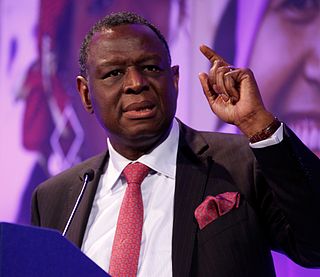A Quote by Mary Robinson
The MDGs have been useful in moving human rights and development discourse together and in highlighting the need for greater accountability at all levels.
Related Quotes
From the Balkans to Africa, from Asia to the Middle East, we have witnessed the weakening or absence of effective governance leading to the ravaging of human rights and the abandonment of longstanding humanitarian principles. We need competent and responsible states to meet the needs of "we the peoples" for whom the UN was created. And the world's peoples will not be fully served unless peace, development and human rights, the three pillars of the UN, are advanced together with equal vigour.
The Millennium Development Goals were a pledge to uphold the principles of human dignity, equality and equity, and free the world from extreme poverty. The MDGs, with eight goals and a set of measurable time-bound targets, established a blueprint for tackling the most pressing development challenges of our time.
Human rights education is much more than a lesson in schools or a theme for a day; it is a process to equip people with the tools they need to live lives of security and dignity. On this International Human Rights Day, let us continue to work together to develop and nurture in future generations a culture of human rights, to promote freedom, security and peace in all nations.
I'm struck by how very few people outside a rarefied world of true believers understand what you mean when you say human rights - that includes development experts and economists who are very keen to implement the UN Millennium Development Goals. They've told me quite frankly, that they don't know exactly what a human rights approach is.
Sexual and reproductive health and rights are universal human rights!They are an indivisible part of the broader human rights and development equation. Their particular power resides in the fact that they deal with the most intimate aspects of our identities as individuals and enable human dignity, which is dependent on control of our bodies, desires and aspirations.
This, then, is the truth of the discourse of universal human rights: the Wall separating those covered by the umbrella of Human Rights and those excluded from its protective cover. Any reference to universal human rights as an 'unfinished project' to be gradually extended to all people is here a vain ideological chimera - and, faced with this prospect, do we, in the West, have any right to condemn the excluded when they use any means, inclusive of terror, to fight their exclusion?
For too long the development debate has ignored the fact that poverty tends to be characterized not only by material insufficiency but also by denial of rights. What is needed is a rights-based approach to development. Ensuring essential political, economic and social entitlements and human dignity for all people provides the rationale for policy. These are not a luxury affordable only to the rich and powerful but an indispensable component of national development efforts.
We must understand the role of human rights as empowering of individuals and communities. By protecting these rights, we can help prevent the many conflicts based on poverty, discrimination and exclusion (social, economic and political) that continue to plague humanity and destroy decades of development efforts. The vicious circle of human rights violations that lead to conflicts-which in turn lead to more violations-must be broken. I believe we can break it only by ensuring respect for all human rights.






























